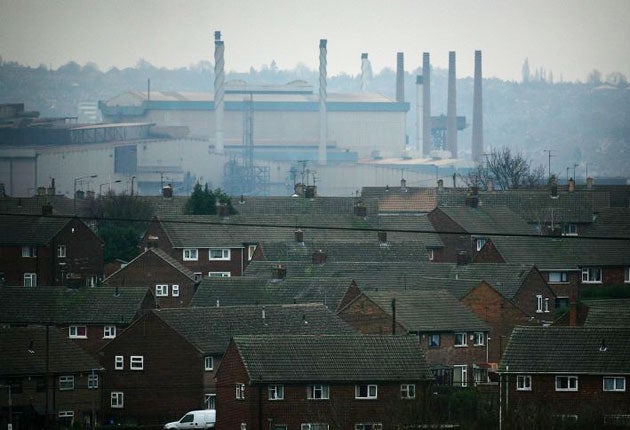Men of steel see their livelihoods melt away in manufacturing slump
Last week Rotherham's women suffered when Burberry cut jobs. Yesterday it was their husbands' turn, writes Jonathan Brown

Your support helps us to tell the story
As your White House correspondent, I ask the tough questions and seek the answers that matter.
Your support enables me to be in the room, pressing for transparency and accountability. Without your contributions, we wouldn't have the resources to challenge those in power.
Your donation makes it possible for us to keep doing this important work, keeping you informed every step of the way to the November election

Andrew Feinberg
White House Correspondent
Another week, another hammer blow delivered to the economy of Rotherham. Seven days ago, it was the turn of the women machinists at the luxury goods maker Burberry to suffer as the recession pounded British manufacturing. Yesterday it was their neighbours at the vast Aldwarke steel works. The Indian owners Corus announced that 713 jobs from a total workforce of 1,600 were being culled in what was once the heartland of British Steel, in a bid to help the firm survive the slump in the global car and aerospace markets.
As the town's largest private employer, the impact of the "restructuring" scheme at the four-square-mile plant cannot be overstated. For each well-paid steel job that is lost, it is estimated that two other positions in the local economy will also disappear, heaping misery on a town where 6,000 people are already claiming unemployment benefit.
So as disconsolate workers streamed out at the end of their shift yesterday, having spent the morning digesting the imminent prospect of redundancy, the mood was extremely sombre, though tinged with a sense of realism that no one seems immune to the travails of the world economy.
"I have never known anything like it," said David Job, an engineer with 42 years' experience in the south Yorkshire steel industry.
"But the firm has been losing money for quite some time. It is the young ones I feel sorry for – the family men with mortgages – and the effect it will have on Rotherham. It is not good at all, but something had to give."
The market for the specialist engineering steel produced at Aldwarke's arc-fired blast furnace has declined by 50 per cent and the company has been losing money here for at least 12 months. Many of the older workers recognise all this from the industrial meltdowns of the Seventies, Eighties and Nineties, which saw all but one of the local coal mines close and huge swaths of manufacturing plant lost forever. But there was a determination that just as the town had risen from the ashes of the Thatcher years, so too would the latest setback prove a temporary one.
An emotional Bob Hudson of the Community union, who boasts 39 years at the plant, said he had no complaints with the present management. He praised their "humanity" in yesterday's dealings with workers, insisting industrial relations were better than ever. Like everyone else, he was profoundly encouraged that Corus bosses appeared committed to keeping steel-making alive in this corner of south Yorkshire. "I am gutted, but we can build back because they are retaining the furnace and we have the heart to come back," he said.
Rotherham, like its neighbour Sheffield, is staunchly Labour – and many were quick to claim the latest job cuts as yet another unwelcome legacy from those unloved Tory years.
Steel, once the bastion of the local economy, is a shadow of its former self, although transformation is possible. Not all plants can replicate the success of the former Steel, Peech and Tozer's massive Templeborough steelworks. At its peak, it employed 10,000 workers, producing 1.8 million tonnes of steel a year. It closed its doors in 1993 and is now the popular Magna Science Adventure Centre. But many fear the industrial theme-park route to recovery, and eyes are turning to the Government of Gordon Brown to soften the blow and prevent the loss of thousands more high-skilled jobs. Yet still the suspicion remains that cash might have been more forthcoming if the workers here had been "wearing bowler hats rather than hard hats".
One former steel worker looking towards Downing Street was Roger Stone, leader of Rotherham Borough Council. "Gordon Brown will get us through this," he insisted. "The loss of any job, from one to 1,000, is devastating to people and their families and to the economy of Rotherham. We will do everything we can to help these people back into work."
Mark Broxholme, Corus site director, was disarmingly upfront: "This is a very difficult time and a lot of employees are extremely upset. But the mood is very constructive and positive in terms of the questions people are asking."
How times change: A shrinking workforce
In 1988, when British Steel was privatised, its workforce was 52,500 and it produced 14.7m tonnes of crude steel a year – three-quarters of the total UK production. Now, Corus has 24,000 workers in the UK who make 13m tonnes of crude steel a year.
Subscribe to Independent Premium to bookmark this article
Want to bookmark your favourite articles and stories to read or reference later? Start your Independent Premium subscription today.
Join our commenting forum
Join thought-provoking conversations, follow other Independent readers and see their replies
Comments